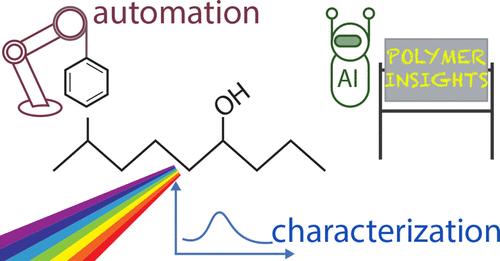当前位置:
X-MOL 学术
›
Macromolecules
›
论文详情
Our official English website, www.x-mol.net, welcomes your
feedback! (Note: you will need to create a separate account there.)
Automation and Machine Learning for Accelerated Polymer Characterization and Development: Past, Potential, and a Path Forward
Macromolecules ( IF 5.1 ) Pub Date : 2024-09-07 , DOI: 10.1021/acs.macromol.4c01410 Peter A. Beaucage 1 , Duncan R. Sutherland 2, 3 , Tyler B. Martin 3
Macromolecules ( IF 5.1 ) Pub Date : 2024-09-07 , DOI: 10.1021/acs.macromol.4c01410 Peter A. Beaucage 1 , Duncan R. Sutherland 2, 3 , Tyler B. Martin 3
Affiliation

|
Automation and machine learning techniques are poised to dramatically accelerate the development of new materials while simultaneously increasing our understanding of the physics and chemistry that underlie the formation of such materials. In particular, the convergence of accessible machine learning tools, the availability of high-quality data, and the advent of accessible experimental automation platforms have led to a number of closed-loop autonomous experimentation platforms or “self-driving labs”. Such platforms integrate robotic experimenters with AI-guided experiment planning to autonomously perform large numbers of experiments without human input. After briefly reviewing the state of the field and the broad classes of autonomous efforts, this perspective outlines several high-value focus areas for future ML-guided characterization efforts. Among many advantages, we expect that autonomous approaches will allow the systematic study of rare and nonequilibrium phenomena, provide dramatically greater measurement efficiency through targeting of cutting-edge, resource-intensive characterization, and enable a higher level of thinking and experimental planning for human investigators. Finally, we outline the principal barriers to realization of these advantages, including: (1) a lack of organizational structures and workforce development for the highly interdisciplinary programs needed; (2) funding and publication mechanisms that assign greater value to individual scientific results than foundational infrastructure development; and (3) a dearth of standards for open interchange of hardware, software, and data among the polymer community. We believe that we are in the early days of a once-in-a-generation shift in the way science is planned, executed, and evaluated, and we hope to provide a blueprint for the broader polymer community to take a leading role in this shift.
中文翻译:

用于加速聚合物表征和开发的自动化和机器学习:过去、潜力和前进的道路
自动化和机器学习技术有望显着加速新材料的开发,同时增加我们对构成此类材料的物理和化学的理解。特别是,可访问的机器学习工具的融合、高质量数据的可用性以及可访问的实验自动化平台的出现催生了许多闭环自主实验平台或“自动驾驶实验室”。此类平台将机器人实验人员与人工智能引导的实验计划相结合,无需人工输入即可自主执行大量实验。在简要回顾了该领域的现状和广泛的自主工作类别之后,该观点概述了未来机器学习引导的表征工作的几个高价值重点领域。在众多优势中,我们预计自主方法将允许对罕见和非平衡现象进行系统研究,通过针对尖端、资源密集型表征提供显着更高的测量效率,并为人类研究人员提供更高水平的思维和实验规划。最后,我们概述了实现这些优势的主要障碍,包括:(1)缺乏所需的高度跨学科项目的组织结构和劳动力发展; (2) 资助和出版机制赋予个体科学成果比基础设施发展更大的价值; (3) 聚合物社区之间缺乏硬件、软件和数据开放交换的标准。 我们相信,我们正处于科学规划、执行和评估方式千载难逢的转变的早期阶段,我们希望为更广泛的聚合物界提供一个蓝图,使其在这一领域发挥主导作用转移。
更新日期:2024-09-07
中文翻译:

用于加速聚合物表征和开发的自动化和机器学习:过去、潜力和前进的道路
自动化和机器学习技术有望显着加速新材料的开发,同时增加我们对构成此类材料的物理和化学的理解。特别是,可访问的机器学习工具的融合、高质量数据的可用性以及可访问的实验自动化平台的出现催生了许多闭环自主实验平台或“自动驾驶实验室”。此类平台将机器人实验人员与人工智能引导的实验计划相结合,无需人工输入即可自主执行大量实验。在简要回顾了该领域的现状和广泛的自主工作类别之后,该观点概述了未来机器学习引导的表征工作的几个高价值重点领域。在众多优势中,我们预计自主方法将允许对罕见和非平衡现象进行系统研究,通过针对尖端、资源密集型表征提供显着更高的测量效率,并为人类研究人员提供更高水平的思维和实验规划。最后,我们概述了实现这些优势的主要障碍,包括:(1)缺乏所需的高度跨学科项目的组织结构和劳动力发展; (2) 资助和出版机制赋予个体科学成果比基础设施发展更大的价值; (3) 聚合物社区之间缺乏硬件、软件和数据开放交换的标准。 我们相信,我们正处于科学规划、执行和评估方式千载难逢的转变的早期阶段,我们希望为更广泛的聚合物界提供一个蓝图,使其在这一领域发挥主导作用转移。

































 京公网安备 11010802027423号
京公网安备 11010802027423号